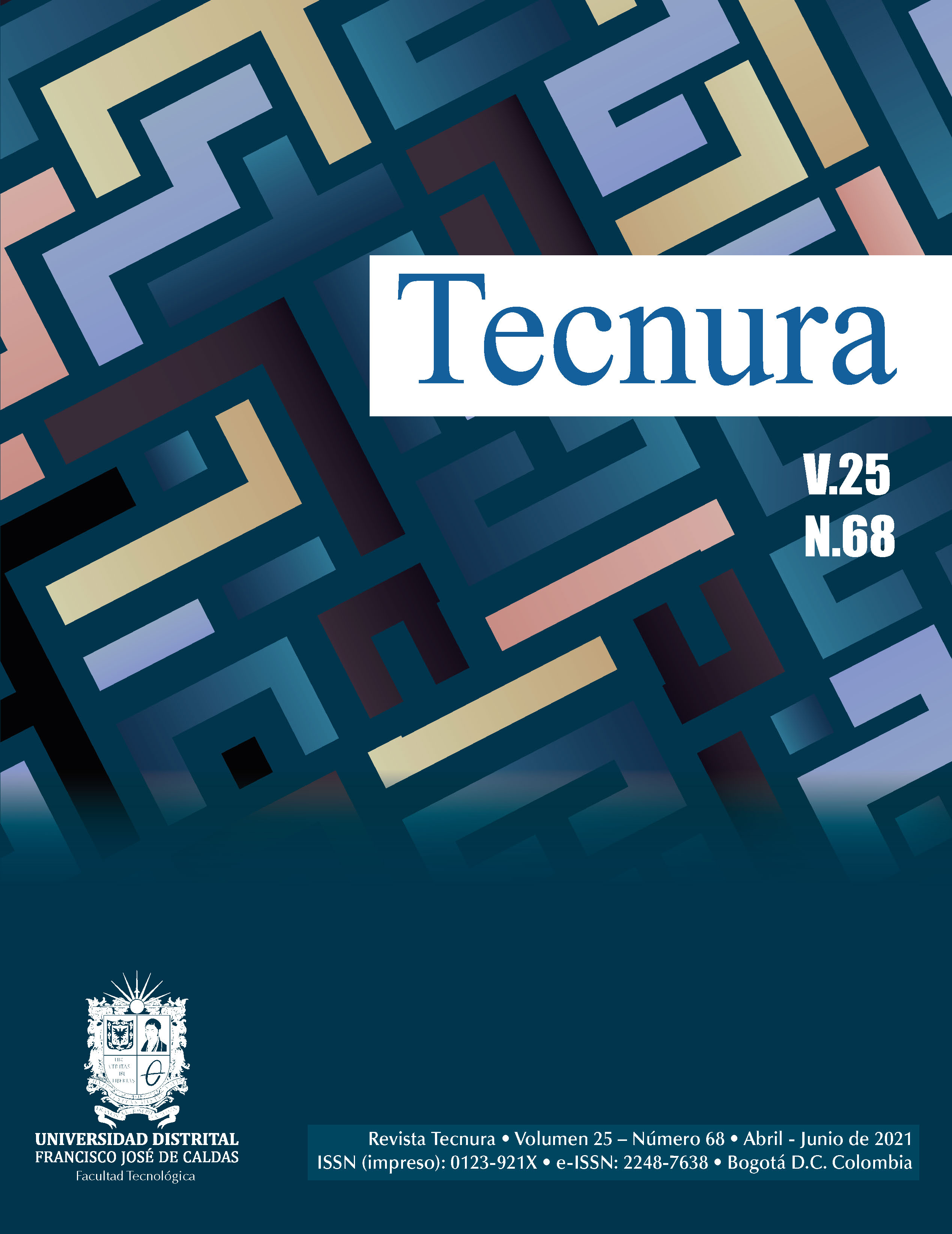DOI:
https://doi.org/10.14483/22487638.16712Publicado:
01-04-2021Número:
Vol. 25 Núm. 68 (2021): Abril - JunioSección:
InvestigaciónCelebraciones corporativas en Colombia: espacios de diversidad, inclusión y productividad
Corporate Celebrations in Colombia: Spaces of Diversity, Inclusion, and Productivity
Palabras clave:
corporate celebrations, productivity, diversity, inclusion (en).Palabras clave:
celebraciones corporativas, productividad, diversidad, inclusión (es).Descargas
Referencias
Balanta-Castilla, N. (2020) Los apodos en la educación superior Colombiana. Revista Boletín Redipe, 9(4), 967. https://doi.org/10.36260/rbr.v9i4.967 DOI: https://doi.org/10.36260/rbr.v9i4.967
Fernández, D. (2012) Festividades corporativas: La mejor inversion. https://mba.americaeconomia.com/articulos/reportajes/festividades-corporativas-la-mejor-inversion
Hevia, J. (2002). Lenguas y devenires en pugna: En torno a la posmodernidad. University of Lima.
Lara-Largo, S. (2015). Usos y debates del concepto de fiesta popular en Colombia. Antípoda. Revista de Antropología y Arqueología, 21, 147-164. https://doi.org/10.7440/antipoda21.2015.07 DOI: https://doi.org/10.7440/antipoda21.2015.07
Murillo, J. (2010). Investigación etnográfica. Trillas. https://fundacionmerced.org/bibliotecadigital/wp-content/uploads/2017/12/I_Etnografica.pdf
Spradley, J. (2008). The Ethnographic Interview. University of Michigan. https://books.google.com.co/books/about/The_Ethnographic_Interview.html?id=XP5_AAAAMAAJ&redir_esc=y
Deal, T. E. & Key, M. K. (1999) Celebraciones en la Empresa: Juego, Proposito y Beneficio en el Trabajo. Ediciones Granica.
Vergel, M., Paz, L., & Rojas, J. (2019) Comportamiento del consumidor de productos en la oferta de tribu inga. CLIO América, 13(25), 311-321. https://doi.org/10.21676/23897848.3408 DOI: https://doi.org/10.21676/23897848.3408
Comunicae.es (2017). Las celebraciones corporativas pueden convertirse en un momento donde fomentar valores y crear vínculos internos. https://www.comunicae.es/nota/las-celebraciones-corporativas-pueden-1174493/
QuestionPro (n.d.). ¿Qué es la investigación empresarial? https://www.questionpro.com/blog/es/investigacion-empresarial/
Cómo citar
APA
ACM
ACS
ABNT
Chicago
Harvard
IEEE
MLA
Turabian
Vancouver
Descargar cita
Recibido: 28 de julio de 2020; Aceptado: 24 de febrero de 2021
ABSTRACT
Objective:
To study corporate celebrations are spaces of inclusion that allow the cultural, personal, and behavioral encounter of the people who make up an organization, which has positive consequences on the productivity of human teams in companies in the short, medium, and long term.
Methodology:
This research is descriptive, that is, the importance of corporate celebrations in organizations and its relationship to productivity in Colombia is disclosed. The population under study corresponds to workers in medium and large companies, regardless of type and sector. The sample was random; for to the selected companies, all or most of the employees were surveyed. Some of the characterization variables considered were age, gender, seniority, role, position, religious orientation, ethnic group, regional origin, symbols, business culture, and productivity. Data collection was carried out through digital surveys.
Results and conclusions:
This research revealed that workers in Colombian companies not only need economic remuneration to have better productivity, but also motivation and the strengthening of social interactions arising from corporate celebrations, which strengthen the identity, stability, and positioning of organizations.
Keywords:
corporate celebrations, productivity, diversity, inclusion..Resumen
Objetivo:
Estudiar las celebraciones corporativas son espacios de inclusión que permiten el encuentro cultural, personal y conductual de las personas que integran una organización, lo que tiene consecuencias positivas sobre la productividad de los equipos humanos en las empresas en el corto, mediano y largo plazo.
Metodología:
Esta investigación es descriptiva, es decir, se divulga la importancia de las celebraciones corporativas en las organizaciones y su relación con la productividad en Colombia. La población objeto de estudio corresponde a trabajadores de medianas y grandes empresas, independientemente del tipo y sector. La muestra fue aleatoria; para las empresas seleccionadas, todos o la mayoría de los empleados fueron encuestados. Algunas de las variables de caracterización consideradas fueron edad, género, antigüedad, rol, cargo, orientación religiosa, etnia, origen regional, símbolos, cultura empresarial y productividad. La recolección de datos se realizó a través de encuestas digitales.
Resultados y conclusiones:
Esta investigación reveló que los trabajadores de las empresas colombianas no solo necesitan una remuneración económica para tener una mejor productividad, sino también la motivación y el fortalecimiento de las interacciones sociales derivadas de las celebraciones corporativas, que fortalecen la identidad, estabilidad y posicionamiento de las organizaciones.
Palabras clave:
celebraciones corporativas, productividad, diversidad, inclusión..INTRODUCTION
This work focuses on celebrations from a human perspective in companies, since parties are a space of freedom that fosters the construction of diversity, regardless of the characteristics of each individual. During festivities, Colombian businesses celebrate community, thus strengthening corporate identity, and they are seen as an element of motivation and strength that will later be reflected in collective actions that generate benefits in terms of productivity and become competitive advantages while always improving the organizational climate.
METHODOLOGY
This research is descriptive, that is, the relationship of celebrations with productivity in companies is disclosed.
This research is qualitative, so context and process are important. Therefore, different methods and techniques such as interviews and surveys were used, which allowed solving the proposed research problem. For this, a mixed method was used, which was initially based on qualitative, descriptive, and analytical methods. This allowed working on the reality of the research objective (Vergel et al., 2019) to collect as much information as possible.
As for the qualitative method, its object of study, according to Murillo (2010), lies in the understanding of the human being, which is seen and analyzed as a process with a holistic conception (Spradley, 2008) in which the different cultural components can be studied (Hevia, 2002). In this case, this study focuses on corporate celebrations in various companies in Colombia, compared to their different actions, through their organizational culture. Regarding the quantitative approach, the statistical techniques of information analysis were used.
This contrast allowed us to describe the celebrations and their relationship with productivity in companies.
The population under study corresponds to workers from medium and large companies in Bogotá, since it was considered that this city is one of the most diverse in the country, due to its central nature.
RESULTS
The age of 78% of the respondents ranges from 25 to 50 years old. 40% are men and 60% are women. 96% said they give importance to parties and 98% reported their liking for corporate celebrations. 2% externalized self-recognition as belonging to an ethnic group, and 10% did not practice any religion while 90% were assumed to be Catholic. Regarding gender, 58% identified themselves as the female and 39% as male. A minimum percentage left this answer blank. 99% stated that they attend corporate celebrations, and only 1% revealed that they do not like such events. Most believe that, when the company celebrates achievements or organizes celebrations, they feel more motivated at work, and productivity indicators increase. The figures show that the organizations under study are already diverse, especially in terms of origin, gender, and age. During the celebrations, diversity and inclusion of all are put to the test without being influenced by any particular characteristic. Furthermore, when celebrations take into account achievements and encourage the staff to achieve goals, they are more engaged and happier.
CONCLUSIONS
Not only do workers in Colombian companies need financial remuneration to have better productivity, but also motivation and the strengthening of social interactions arising from corporate celebrations, since these strengthen the identity, stability, and positioning of organizations.
According to workers, the human effects derived from corporate holiday practices have a positive impact on productivity, health, and happiness indicators in their companies.
Colombia is a sum of regions, festivals, rituals, and ceremonies that are mixed in companies in an interesting network of cultural diversity, which, instead of being an obstacle, has become an opportunity to create symbolic ties and encourage joint actions for the sake of growth, both from human and productive perspectives within organizations.
Acknowledgements
ACKNOWLEDGEMENTS
This article is part of a subproject emerging from the macro-project: “Approximation to the social representation of the celebrations of life and that covered five countries: Cuba, Paraguay, Mexico, Peru and Brazil”.
REFERENCES
Licencia
Esta licencia permite a otros remezclar, adaptar y desarrollar su trabajo incluso con fines comerciales, siempre que le den crédito y concedan licencias para sus nuevas creaciones bajo los mismos términos. Esta licencia a menudo se compara con las licencias de software libre y de código abierto “copyleft”. Todos los trabajos nuevos basados en el tuyo tendrán la misma licencia, por lo que cualquier derivado también permitirá el uso comercial. Esta es la licencia utilizada por Wikipedia y se recomienda para materiales que se beneficiarían al incorporar contenido de Wikipedia y proyectos con licencias similares.


